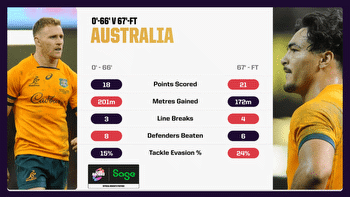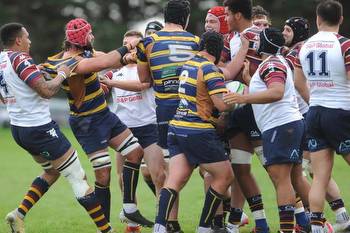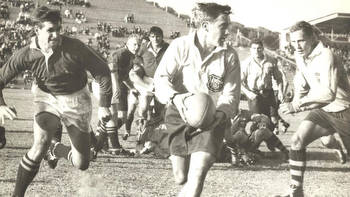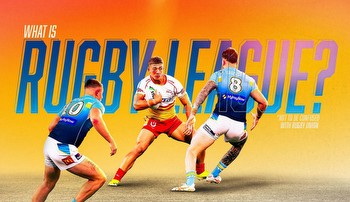How to bet on rugby
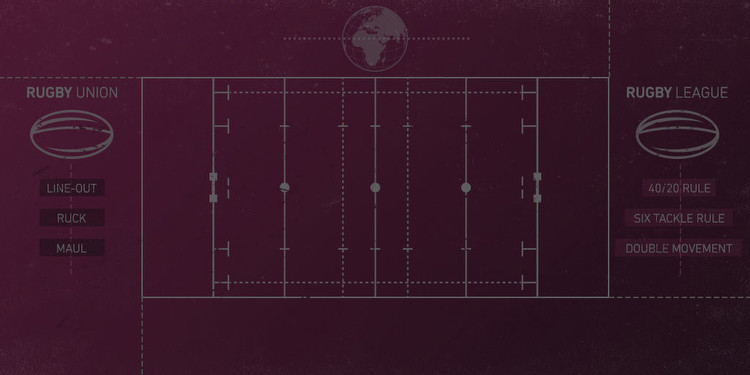
The birth of rugby is one of the most interesting stories in sporting history. William Webb Ellis, a 16-year-old student at Rugby school, picked up the ball and ran with it while playing soccer back in 1823. Since then, official rules were created, before the sport disbanded into two codes (Rugby Union and Rugby League) and we were left with the modernised versions of the game we have today.
How to bet on rugby - Rugby Union vs. Rugby League
Unlike golf betting, rugby betting consists of two very different sports. Understanding the differences between both formats will help bettors learn how to bet on rugby - a similar logic should be applied if you want to learn how to bet on cricket where test cricket and limited overs cricket are very different when it comes to betting.
Armed with basic knowledge of rugby, bettors can then build on this and bet on both forms of the sport. Below is a basic explanation of the rules of Rugby Union and Rugby League and how the two differ.
Rugby Union
Two teams of 15 players compete in a game that lasts 80 minutes (two 40 minute halves). The aim is to ground the ball in a marked section at the opposite end of the pitch to score a “try” which is worth five points.
After a try the attacking team has the chance to score an additional two points by kicking a “conversion” through the H-shaped posts - this is taken from in-line with where the try was scored but as far back as the kicker wishes to place the ball.
Teams will attack by moving forward whilst passing the ball backwards (the ball can be kicked in any direction). The defending team must try to stop movements forward by tackling the attacking side - if the attacker falls to the floor after being tackled a “ruck” is formed. If the attacker stays on their feet it is referred to as a “maul”.
The major difference between the two codes is the rules after a tackle - there are no “rucks” or “mauls” in Rugby League.
After an infringement has occurred (offside, tackling above the shoulders, entering a ruck or maul from the side, knocking the ball forwards - more rules can be found here) the opposing side can either kick the ball downfield for a “line-out”, put the ball in for a “scrum” or take a kick at goal (the same as a conversion but worth three points); the options available also depend on the severity of the infringement.
Rugby Union terminology
Rugby League
Despite some similarities, there are numerous differences between Rugby Union and Rugby League that anyone who wants to learn how to bet on rugby should be aware of.
Rugby League is often considered more fast-paced than Rugby Union yet the basic principles of the two formats are the same - teams try to outscore the opponent by scoring trys (worth four points in Rugby League), conversions (worth two points in both formats) or drop goals (often referred to as a “field goal” in Rugby League and only worth one point instead of three).
There is no limit to the time in possession in Rugby Union, whilst in Rugby League the attacking side can only be tackled six times before they must turn over possession.
Similarly to Rugby Union, Rugby League consists of two 40-minute halves but only 13 players compete for each team in the latter. The major difference between the two codes is the rules after a tackle - there are no “rucks” or “mauls” in Rugby League and instead, the attacking side simply retain possession by rolling the ball back to a teammate using their foot.
There is no limit to the time in possession in Rugby Union, whilst in Rugby League the attacking side can only be tackled six times before they must turn over possession. Additionally, there are no line-outs in Rugby League - the teams contest a scrum after the ball goes out of play.
Rugby League terminology
Although there are slight nuances, a scrum, turn over and drop goal (field goal) mean the same thing in both formats. However, there are a few terms in Rugby League that don’t exist or are very rarely used in Ruby Union
Rugby betting - Available markets
Pinnacle offers a wide variety of both Rugby Union and Rugby League betting markets. In addition to several international competitions such as the World Cup and the Six Nations, bettors can also choose from a range of domestic leagues in Europe, Australia and New Zealand as well as continental club competitions like the European Rugby Champions Cup and European Rugby Challenge Cup.
The popularity of Rugby League is less widespread across Europe and is more concentrated in the north of England and France - the Super League and Championship are the main competitions in England with the Elite One Championship and Elite Two Championship being France’s equivalent.
Rugby League is also very popular in Australia with the NRL (National Rugby League) and Super Premiership NSW (New South Wales) being the two most renowned competitions. The Rugby League World Cup, Four Nations and European Championship are the highest-level international competitions in Rugby League.
basic bet types that are common amongst most sports; Money Line, Handicap and Totals.
Money Line
The Money Line in rugby betting is a bet on who you think will win the match. This is the same for both Rugby Union and Rugby League and is considered the simplest form of betting.
Handicap
Once bettors know how to bet on rugby in terms of the Money Line, they will often progress to Handicap betting to try and find more value. The handicap in rugby betting refers to an advantage the bookmaker gives one team to make the game more balanced.
The team with a negative handicap must win by more than the figure set by the bookmaker in order for a bet on them to win. The team with a positive handicap must win, draw or lose by less than the figure set for a bet on them to win.
Totals
Totals betting in rugby is when a bettor places a bet on the total number of points to be scored in a match. The bookmaker determines the Totals figure and bettors can either bet on the number of points to be over or under that figure.
Now that you know the difference between Rugby Union and Rugby League, you can begin to expand your knowledge from the basics of how to bet on rugby to be able to find value in rugby betting markets.
Interested in betting on other sports? Our how to bet on tennis and how to bet on baseball guides are a great place to start.















